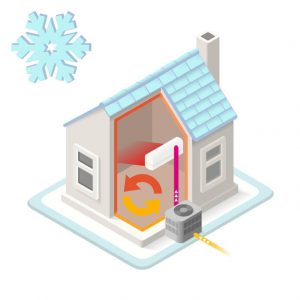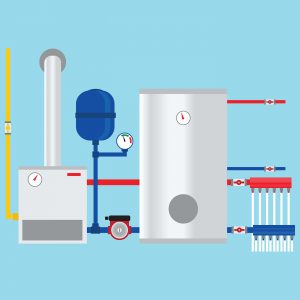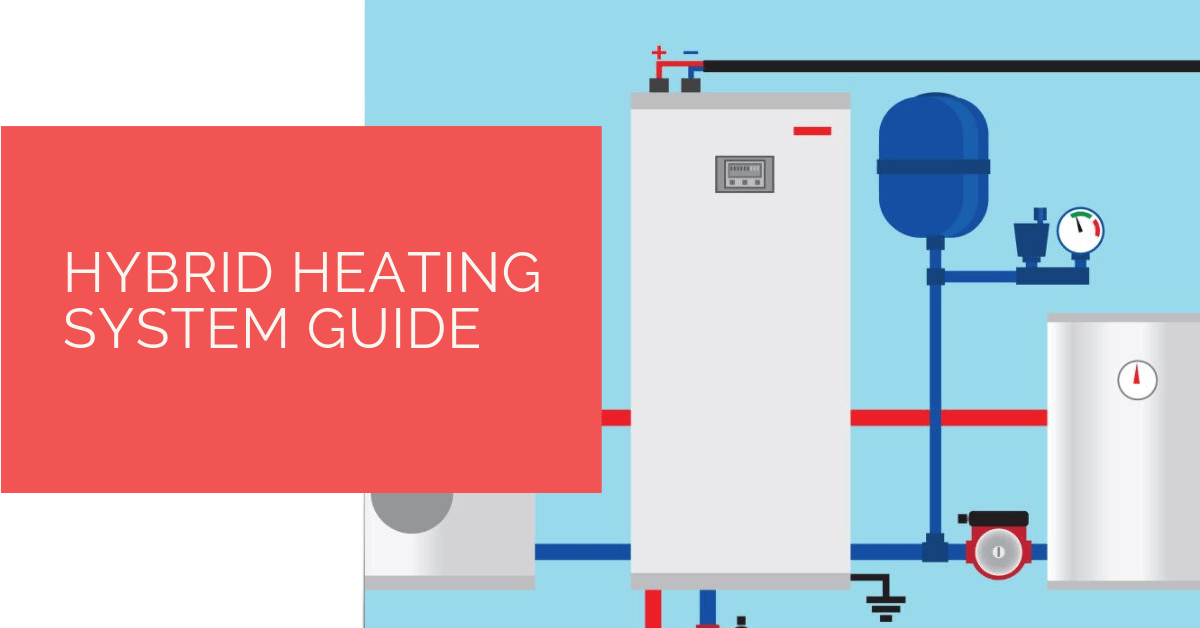A renewable heating system offers a lot of benefits to both residential and commercial properties. From a clear energy balance to long-term savings, there are countless advantages of using a renewable heating system. There are two types of heating system that is prevalent in the UK:
ASHP systems use outside air to distribute heat indoors. Most people prefer the ASHP system because of limited outdoor space. There is no need to dig or drill the ground to install this unit. All that is required is some space to install the external fan unit.
GSHP, on the other hand, extracts heat from rocks, river beds, and surface soil. It is slightly complicated to install the entire unit because it requires shallow trenches and a deep borehole that contain the inner unit. This helps the system to absorb the ground heat, which is transferred to the heat exchanger in the property. A significant benefit of this system is it requires low maintenance.
Contents
- 1 Key Takeaways
- 2 What Are Hybrid Heating Systems?
- 3 What Are the Benefits of a Hybrid Heating System?
- 4 What Are the Disadvantages of a Hybrid Heating System?
- 5 How Much Does a Hybrid Heating System Cost?
- 6 Case Study: Implementing a Hybrid Heating System for Energy Efficiency
- 7 Expert Insights About Hybrid (Dual Fuel) Heating System Guide
- 8 Heat Pump Source: Reliable Heating and Cooling Solutions
- 9 Conclusion
Key Takeaways
- A hybrid heating system combines renewable energy sources like air or ground source heat pumps with traditional fossil fuels (e.g., LPG or gas) to provide efficient and versatile heating throughout the year.
- Hybrid heating systems are known for their efficiency and longevity. They can adapt to seasonal temperature changes, reduce energy consumption, and extend heating units’ lifespan.
- By strategically utilizing renewable energy and fossil fuels, hybrid heating systems can save homeowners as much as 30 to 50% on energy bills compared to traditional heat pumps. However, there are upfront installation costs to consider.
What Are Hybrid Heating Systems?
Apart from the above-mentioned types of heating systems, there is another set up known as a hybrid heating system. Experts also call it a dual fuel unit. It uses a combination of fossil fuels and renewable energy to heat the property. One of the components of this system is the heat pump used in ASHP or GSHP units, while the second component is LPG or traditional gas. This is why it is known as a hybrid heat pump because it combines two systems into one so that it can maintain the heating efficiency throughout the year.
Hybrid heat pumps are designed to suit the heating needs of people while keeping in mind to cut down the energy use and also save a significant amount of money on utility bills. The reason why most people prefer this system is it is more efficient than all the other types of heating systems. It conveniently switches between fossil fuel and renewable energy depending on the efficiency and need of the user. This makes sure that the user feels comfortable whenever the heat pump is on, but without compromising on the performance of the machine.
Hybrid heat pumps operate according to the outside temperature. If it is not too cold outside, the system will use low energy to keep the house warm enough to make the user feel comfortable. When the temperature dips outside, the heat pump will switch to the fossil fuel boiler instead of working on renewable energy. This generates heat faster so that the user doesn’t feel too cold in the winters.

What Are the Benefits of a Hybrid Heating System?
As already mentioned, hybrid heat pump systems have numerous benefits due to which they have become the need of the hour for many people, especially the ones who experience chilly winters. The main benefits are listed below.
Efficiency
People can use this system throughout the year. It can keep the rooms cold during autumn and summer. On the other hand, when winter arrives, it will convert from an air conditioner to a heater to keep the house nice and warm. Depending on the outside conditions, the operating system of the pump will change. It will start the traditional system to heat the rooms and also reduce the pressure of the renewable energy system.
Durable
The longevity of the heating system is another reason why hybrid dual fuel pumps are popular. Since this works on a hybrid system, both the traditional and renewable energy will not be pressurized. This not only improves the efficiency and life expectancy of the heating unit but also makes maintenance much easier. The hybrid setup will make sure that the heating system doesn’t become inefficient or tired and eventually, breakdown. Heat pumps usually last for years, but with a hybrid system, people can expect a longer life than regular heating units.
Saves Money
Heat pumps tend to use up a lot of energy. This increases the monthly energy bills to a great extent, especially during the winters. But, when there is a hybrid heat pump, it uses renewable energy that saves doesn’t involve fossil fuels all the time. This helps to save a significant amount of money on energy bills every month. Experts believe that hybrid heating systems can save as much as 30 to 50% of the energy bills that homeowners would usually pay if they use a traditional heat pump.
What Are the Disadvantages of a Hybrid Heating System?
While hybrid dual fuel heating pumps are known for their many benefits, people should also know about some of the disadvantages of this system. Here are a few cons that everyone should be aware of.
Using Fossil Fuel
Albeit the fact that it is a hybrid system and the pump will use renewable energy most of the time, it is impossible to deny the fact that it still uses fossil fuel which is highly expensive. When the world is moving towards smart renewable heating system, this technology may not be fruitful in the long run, especially when the aim is to remove fossil fuel from all the commercial and residential properties in the UK.
Installation Cost
The installation cost is usually high when it comes to hybrid heat pumps. A hybrid system is installed when the house or the property already has a traditional heating system. But, if an entirely new installation is considered, the cost to install two systems will bequite expensive compared to installing a boiler or a heat pump. On the other hand, if a user considers the long-run efficiency of the system, it will help them save a lot. With lower utility bills, it will balance out the installation cost only in a few years. Since the user will not require the fossil fuel system to work throughout the year, he/she can expect to save later even though the installation may seem expensive.
It is always wise to consider the time or the number of years a person wants to live in the property. Hybrid systems are always beneficial in the long run that will add to the value of the house if it is put up for sale. Those who are planning to live in the home for a short time, it is wise not to invest in this system due to the high initial cost.

How Much Does a Hybrid Heating System Cost?
Installing a new boiler will usually cost around £500 to £2500. However, it depends on the size of the property and the money that the user wants to spend. If the user wants a combination of air source heat pump with a hybrid heating boiler, the total cost will be approximately £5,000 to £10,000. This will include the cost of installation also. Ground source heat pumps usually cost around £13,000 to £20,000, including the integration and installation of the hybrid system.
Case Study: Implementing a Hybrid Heating System for Energy Efficiency
Background
Heat Pump Source was approached by a homeowner seeking to upgrade their traditional heating system to a more efficient and environmentally friendly solution. The client was particularly interested in reducing their energy bills and carbon footprint while ensuring reliable heating during the cold winter months.
Project Overview
After a thorough assessment, we recommended the installation of a hybrid heating system. This system combines an air source heat pump (ASHP) with a traditional gas boiler, providing the best of both renewable energy and conventional heating technologies. The property, located in a suburban area, had ample space for the external fan unit required for the ASHP.
Implementation
- System Assessment and Design: Our team conducted a detailed site analysis, taking into account the property’s size, insulation levels, and existing heating infrastructure. We designed a hybrid system that seamlessly integrates the ASHP with the existing gas boiler.
- Installation of ASHP: The ASHP was installed outdoors with proper spacing and orientation for optimal performance. The unit was connected to the internal heating system and integrated with the existing boiler.
- Control System Integration: A smart control system was installed to manage the transition between the ASHP and gas boiler, ensuring the most efficient energy source was used based on external temperatures.
- Testing and Calibration: The entire system was tested and calibrated to ensure optimal performance. We conducted thorough checks on the control system, ensuring that it correctly switched between the heat pump and boiler.
- Client Education and Maintenance Plan: We provided the homeowner with a detailed guide on operating the new hybrid system and set up a regular maintenance schedule to ensure long-term efficiency and reliability.
Results
- Energy Efficiency: The hybrid system provided a substantial increase in energy efficiency, with the ASHP handling most of the heating needs during milder weather and the gas boiler providing additional support during colder spells.
- Cost Savings: The homeowner reported a 40% reduction in their monthly energy bills, demonstrating the cost-effectiveness of the hybrid system.
- Environmental Impact: By utilising renewable energy for a significant portion of their heating needs, the homeowner was able to reduce their carbon footprint, contributing to a more sustainable household.
Summary
The implementation of a hybrid heating system successfully met the client’s goals of reducing energy costs and environmental impact. By combining the strengths of both air source heat pumps and traditional gas boilers, the system provided efficient, reliable heating throughout the year. The project showcased Heat Pump Source’s expertise in delivering tailored, high-quality heating solutions that meet the unique needs of UK households. The client was highly satisfied with the results, enjoying both immediate cost savings and the long-term benefits of a sustainable heating solution.
Expert Insights About Hybrid (Dual Fuel) Heating System Guide
Hybrid heating systems provide an excellent balance between efficiency and reliability. By utilising both renewable energy and traditional fuels, homeowners can enjoy year-round comfort while significantly reducing their energy costs.
Chief Engineer
One of the key advantages of hybrid systems is their adaptability. They automatically switch between heat pump and fossil fuel operations based on outdoor temperatures, ensuring optimal performance and energy savings.
Renewable Energy Specialist
For properties with existing heating systems, upgrading to a hybrid system can be a smart investment. It not only enhances efficiency but also extends the lifespan of both the heat pump and traditional boiler components.
Senior HVAC Consultant
Heat Pump Source: Reliable Heating and Cooling Solutions
At Heat Pump Source, we take pride in our unwavering commitment to serving the UK with top-tier HVAC solutions. From the efficiency of heat pumps and the cool relief of air conditioning to the warmth of boilers, radiators, and underfloor heating, our dedicated team is always at the forefront of innovation. We understand the unique needs of every household and business, and we strive to provide dependable health and cooling products and services that are tailored just for you. Ensuring your comfort and satisfaction is our utmost priority. Whether you have questions, need guidance, or require support, we’re always here to assist. Please don’t hesitate to contact us; we’re eager to be of service.
Conclusion
It is always wise to use heat pumps alone. But, if the house already has a traditional heating system and the user wants to save on energy bills, then a hybrid system will be highly beneficial. These systems are allowing homeowners to shift to a new type of heating system that not only uses renewable energy but also lasts longer than other heat pumps. Its energy efficiency and ability to provide the much-needed comfort to the user are a few reasons why people prefer to install it even if the initial set up cost is higher than traditional heating systems.
About the Author
At Heat Pump Source, our articles are the product of a collaborative effort among a team of highly skilled HVAC experts. Our dedicated professionals, hailing from diverse backgrounds in heating, ventilation, air conditioning, and refrigeration, contribute their extensive knowledge and experience to every piece of content. This multidisciplinary approach ensures comprehensive coverage. Our commitment is to deliver authoritative, reliable, and tailored advice to meet the unique needs of every household and business across the UK.

